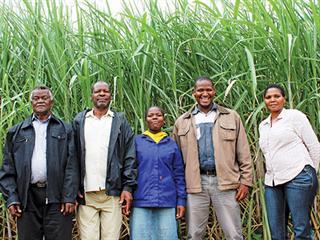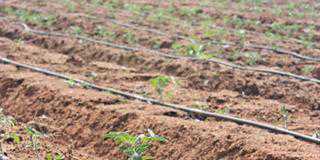
The Mganyaneni Farmers’ Company (MFC) is one of more than 50 community-owned sugarcane farming operations that are eventually set to cover of 5 000ha of irrigated land in Big Bend, Swaziland, as part of the Lower Usuthu Smallholder Irrigation Project (LUSIP). Thanks to the Swazi government, the EU, the Swaziland Sugar Association (SSA), Illovo Sugar and a number of private sector financial institutions, the project is bringing hope to the impoverished region.
Shareholders
The MFC has 30 shareholders, seven of whom are women. Like the other LUSIP operations, it supplies its harvests to Illovo’s Ubombo Sugar Mill. A woman of few words, MFC farm manager Philile Ndlela can’t help but laugh when asked if her family’s income has improved since they switched from growing maize and sorghum.
“We earn much more from sugarcane,” interjects MFC chairperson Elias Mamba on her behalf.
“We used to live in mud huts that often fell down during storms. Now we have stronger houses.
“We’ve also already used part of our income from sugarcane to invest in property to rent out in Manzini,” he continues.
“Our children’s school fees are already paid this year. We can quickly pay off our production loans, we’ve properly fenced our sugarcane lands, and we plan to develop other parts of our farming business with our income.”
Swaziland’s sugar industry has historically been very successful, but has also been dominated by multinational companies and large commercial sugarcane growers, notes Guy Williams, Illovo’s regional director for Swaziland and Mozambique. Through the LUSIP the Swazi government wanted to start harnessing the benefits of the sector for Swazi citizens as well, he says.
Illovo lent its support to the project by committing to take the sugarcane from LUSIP land. Indeed, the prospect of an extra 5 000ha of sugarcane was one of the factors that made the recently completed R1,3 billion expansion of Ubombo Sugar Mill financially viable, adds Oswald Magwenzi, managing director of Illovo’s Ubombo Sugar Limited (USL), the company that owns the mill.
Getting started
For the project to be successful, water for irrigation was needed, as average annual rainfall in the Big Bend area is about 650mm, notes Oswald. He has been involved in the LUSIP’s development from the beginning. With this in mind, the R1,4 billion Lubovane Dam was built using funds from various international and regional development organisations, as well as the Swazi government.
Construction was completed in 2008 and the dam has a capacity of 155 million m3. “It’s fed by a 21km canal that diverts floodwaters from the Usuthu River and holds enough water to irrigate 12 000ha agricultural land,” says Oswald. Also important for the project’s success was securing the support of the traditional chiefs in Big Bend. This task fell to the Swaziland Water and Agricultural Development Enterprise (SWADE), the primary manager of the LUSIP’s implementation and ongoing development.
Traditional values
“Traditional values are very important in Swaziland and must be respected,” explains Oswald. “The chiefs manage Swazi national land on behalf of the king. They had to be consulted to get their permission to allocate land to the LUSIP’s development.” The chiefs also encouraged their subjects to participate in the LUSIP, adds Oswald.
Once suitable land was identified for the LUSIP, SWADE had the unenviable task of amalgamating multiple small plots into larger, more manageable sugarcane farming operations. Swazi residents are typically allocated about 2ha of land on which to build a homestead and grow crops. On its own, an allotment is simply too small to benefit its owner through economy of scale.
Aiming for independence
According to Oswald, it cost approximately R70 000/ha to develop irrigated sugarcane land for the community-owned farming companies participating in the LUSIP. More than 2 400ha of the 5 000ha has been developed since 2007. Each company has 30 shareholders or so and manages about 100ha contiguous sugarcane lands. “This is well above the minimum 40ha required to make an irrigated sugarcane farm that harvests cane on a 12-month cycle financially viable,” says Oswald.
The LUSIP companies receive technical support and training from the Swaziland Sugar Association. Since the Ubombo mill has its own standards for the sugarcane it receives from various sources including the LUSIP farmers, the SSA has sub-contracted Illovo to provide extension services to the companies. The Swazi government, Illovo and the other project funders want the LUSIP farmers to be as independent as possible.
One way to achieve this is by sending each company’s sugarcane production manager to the South African Sugarcane Research Institute, to earn a Junior Certificate in Sugarcane Production, as Philile has done. The managers also receive hands-on training at the Ubombo mill’s own cane-growing operations. “You must remember that these people have never grown sugarcane before. They need to be trained from the beginning,” says Oswald.
To encourage full independence of the LUSIP farming companies is the requirement that each contributes 30% equity towards the production costs of its first sugarcane crop.
Securing loans from banks
The EU/Swaziland government grant covered 70% of this cost. Companies that needed to could approach the commercial bank of their choice for a loan to cover their 30%. The Mganyaneni Farmers’ Company, for example, negotiated its loan with Nedbank.
According to Oswald, well-run LUSIP sugarcane farming companies have taken only two to three years to repay the loans and continue to generate enough income to buy ongoing production inputs, pay off additional loans and disburse profit equitably among the shareholders.
Another benefit already emerging from the LUSIP is the provision of contracting services by enterprising individuals who are not necessarily shareholders in a farming company. These could be in the form of contract labour or machinery hire. In addition, income making its way into the Big Bend and LUSIP communities is valuable for growing the local economy.
Success story
“We were very excited to become participants in LUSIP,” says MFC chairperson Elias Mamba.
“We harvested our first sugarcane crop in 2011 and sent it to Ubombo Sugar Mill.
“The mill paid all of our sugarcane proceeds from that harvest to Nedbank, which then deducted 25% of the 30% loan we had with the bank. Part of the remaining money we used in our operations budget. The rest was invested for our shareholders and also paid out equally as shareholding returns. “Last year, our harvest averaged 147t/ha. We are very proud.”
Contracting services
The MFC currently uses contractors for activities such as ripping, cane ripening and harvesting, but is already saving for the day it will be able to buy its own tractors and implements. “We see our lives improving into the future. There is no reason for us to be poor anymore,” stresses Elias.
An interest in lusip’s ongoing success
Oswald, Guy and the Illovo Sugar Group are also pleased with the progress made by LUSIP participants. “With Illovo’s R1,3 billion expansion investment in Ubombo Sugar Mill we have a vested interest in the ongoing success of the LUSIP farming companies,” explains Guy. “It’s essential that the mill get the LUSIP’s projected 500 000t of sugarcane per year to crush as
soon as possible and then on a consistent basis.”
Oswald points out that, while the LUSIP farming companies have significant autonomy, Ubombo will continue to assist them, using its extensive resources and sugarcane production expertise. “We consider ourselves a knowledge centre,” he explains. “We also grow and supply top quality, disease-free and area-specific N25 and N23 seed cane varieties to the LUSIP farming companies. “It’s vital to set the farming companies up not to fail.”
Phone Chris Fitz-Gerald of Illovo on 031 508 4464, email [email protected], or visit the website www.illovosugar.com.













